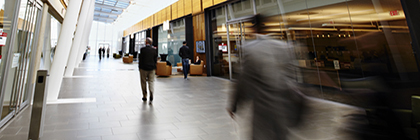There is no statistical evidence that global cigarette consumption has fallen as a result of the World Health Organization (WHO) Framework Convention on Tobacco Control (FCTC), and in low- and middle-income countries it has actually increased, according to two studies led by global health researchers at York University.
The studies, published in the British Medical Journal on June 20, put into question the widely held belief that the FCTC has been the most successful health treaty ever created. An international treaty adopted in 2003 to reduce harmful tobacco consumption, the FCTC’s effects on cigarette consumption had never been scientifically studied on a global level. The research also puts the spotlight on the urgent need not only for investment in tobacco control practices but also an evaluation of the effectiveness of this international law and reporting practices.

“The policies promoted by this treaty – plain packaging, smoke-free areas, tobacco taxes – have been monolithically proven to be effective,” said Steven Hoffman, professor in the Dahdaleh Institute for Global Health Research, Faculty of Health, and Osgoode Hall Law School, who is lead author of the studies. “What this study shows is that it’s probably not enough at the global level to recognize these policies as important or to formally adopt them. We need countries to implement them to make sure they’re affecting people’s lives around the world. If not, what’s at stake, according to the WHO, is one billion people around the world might die from tobacco consumption in the 21st century.”
In the first study, Hoffman and co-author Mathieu Poirier, assistant professor, York University’s Faculty of Health, analyzed data collected from 71 countries, representing 95 per cent of the world’s tobacco consumption and more than 80 per cent of the world’s population between the years of 1970 and 2015. The data collection is the largest appraisal and selection of comparable national estimates of tobacco consumption done to date, in an effort to better understand international cigarette consumption trends since 1970. Researchers found that cigarette consumption fell in most countries; however, consumption trends varied from country to country, especially in lower-income countries.
The open-access dataset looked at sales, production, imports and exports, with up to six different sources compiled for each country per year. Researchers found a general decline in per capita cigarette consumption beginning around 1985 in five of the top 10 cigarette-consuming countries: United States, Japan, Poland, Brazil and Germany. The United States, Canada and Australia all demonstrated similar continuous declines in consumption since the early 1980s, while Latin American and Caribbean countries experienced more modest declines. In contrast, per capita consumption rose steadily in China and Indonesia. China was found to be the world’s leading consumer of cigarettes, with more than 2.5 million metric tonnes consumed in 2013 – in excess of the next 40 highest consuming countries combined.
In the second study, Hoffman and his team used the data from the first study and looked at it in the context of the Framework Convention on Tobacco Control, which has been ratified by 181 countries since its adoption in 2003. This gave researchers a clear intervention point on tobacco consumption for the study, which used two quasi-experimental methods: interrupted time-series analysis and in-sample forecast event modelling. The data showed no significant change in the rate at which global cigarette consumption had been decreasing after adoption of the treaty.
“This study sets a new gold standard for how to evaluate international laws,” said co-author Poirier. “The FCTC was widely celebrated at the time it was launched and no one has actually evaluated that treaty on a global level until now.”
The research showed that after 2003, high-income and European countries experienced a decrease in annual consumption by more than 1,000 cigarettes per adult, while low- and middle-income and Asian countries showed an increase of more than 500 cigarettes annually per adult.
Researchers suggest that varied implementation of tobacco control policies and shifting trends in cigarette affordability across countries may have generated market equilibrium effects that incentivized the tobacco industry to move its lobbying, marketing and promotion activities away from countries with strict guidelines and toward countries with less stringent measures.
“We found quantitative evidence that could support that idea: that tobacco companies, after the Framework Convention on Tobacco Control, specifically went to jurisdictions that were not implementing proven tobacco control policies as rapidly as we saw in high-income countries,” said Hoffman. “If this is true, this means the FCTC could even have unintentionally caused harm by encouraging tobacco companies to target the many more people who live in in these areas and Asian countries who would have fewer governmental protections against the companies’ efforts.”
Watch interview with the authors below.












 A two-day symposium at York University, May 30 and 31, will bring together some of the world’s top legal scholars and jurists to explore issues related to serious international crimes, human rights and forced migration.
A two-day symposium at York University, May 30 and 31, will bring together some of the world’s top legal scholars and jurists to explore issues related to serious international crimes, human rights and forced migration.










 The current refugee crisis, predominantly driven by protracted non-international armed conflicts that are geographically concentrated in the Middle East, Africa and South East Asia, needs to be addressed at its root cause. The mass production of refugees from zones of extreme political violence in the form of protracted non-international armed conflict has resulted in the greater prominence of the “exclusion clauses” of the 1951 Convention relating to the Status of Refugees, Article 1F.
The current refugee crisis, predominantly driven by protracted non-international armed conflicts that are geographically concentrated in the Middle East, Africa and South East Asia, needs to be addressed at its root cause. The mass production of refugees from zones of extreme political violence in the form of protracted non-international armed conflict has resulted in the greater prominence of the “exclusion clauses” of the 1951 Convention relating to the Status of Refugees, Article 1F.